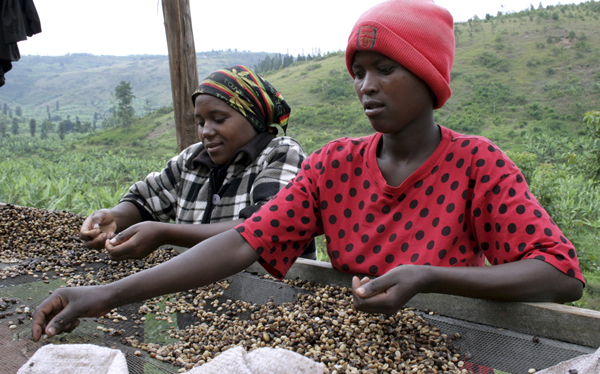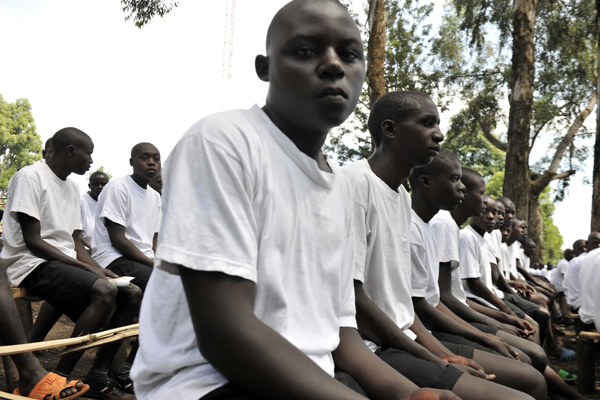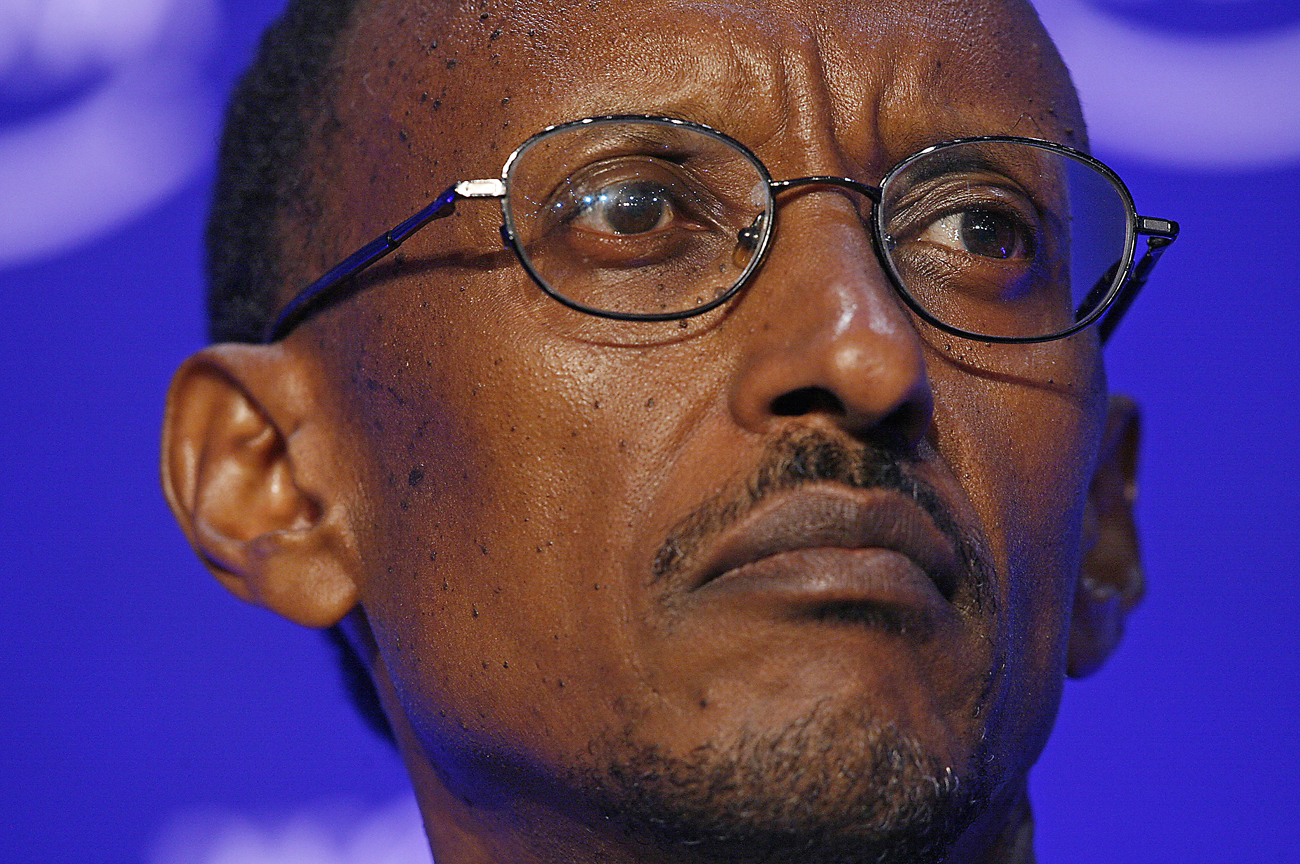Strangely enough, maybe there are three different Rwandas which coexist in the same physical space.
There is the “Hotel Rwanda” version in which the country of 11.3 million has been a killing ground for generations with a terrifying, fratricidal genocide. This violence has washed back and forth over the entire Great Lakes region of East Central Africa, generating waves of refugees in an unending cycle of human misery. This is the Rwanda that has absorbed the attention of a South African president as well as dozens of other high-flying, world-class arbitration and negotiation figures for years.
Then there is “Rwanda Version-2.0”, the country that is home to those fabled mountainside gorilla refuges in those fabled mists studied by the equally fabled Dian Fossey - and the hard currency-earning eco-tourism industry that has come about because of these magnificent but endangered primates.

Photo: Rwandan soldiers march past a crowd gathered to watch thousands of Rwandan troops returning home across the border at Goma in eastern Congo, February 25, 2009. Rwandan troops began withdrawing from Congo on Wednesday, stoking fears that Rwandan Hutu rebels will step up reprisals against civilians and retake ground they lost during a month-long offensive against them. Rwanda sent thousands of troops into Congo's North Kivu province last month and the former enemies have been conducting joint operations against Rwandan Hutu rebels seen as a root cause of 15 years of conflict in the region. REUTERS/Finbarr O'Reilly
And then there is the Rwanda that, latterly, has become the poster boy for infrastructure investment, lower corruption, better tax collections, movement from dependence on foreign aid and the encouragement of venture capital investment in Africa. This is the Rwanda that is the favoured child of the International Monetary Fund and World Bank and whose President, Paul Kagame, gets all those invitations to all those investment conferences so he can speak about all those wonders of the new Rwanda rising from the ashes.
But, in recent days, a legacy of Rwanda's old, more treacherous past has now reached South Africa in a dispute between the two nations over what appears to have been an attempted assassination of an exiled Rwandan general living in South Africa, Faustin Kayumba Nyamwasa, and Rwandan complaints about the way the South African police have investigated the shooting.
To review, back on 19 June, Nyamwasa was shot and seriously wounded outside his home in Johannesburg. His wife and Rwandan media opposing Kagame's bid for re-election next month laid the blame for the attack on Kagame's government. Not surprisingly, the Rwandan government then hit back at South Africa over insinuations that Rwanda was trying to carry out a pre-election purge of the military's top brass.

Photo: Workers sort coffee beans at a washing station cooperative in the outskirts of the capital Kigali, May 28, 2009. REUTERS/Hereward Holland
Rwanda's foreign minister Louise Mushikiwabo, put on her game face to tell the international media she had called South Africa's ambassador to express her outrage over the way the probe into Nyamwasa's shooting had been carried out down here. According to Mushikiwabo, “Some insinuations emanating from official circles in South Africa and carried in the media appear to be pointing a finger at the Rwandan government. Naturally, there is no truth to this. We find these insinuations very alarming.” South African foreign ministry sources had earlier suggested that some unnamed, but clearly nefarious foreign agents had been involved in the assassination attempt.
Only a few days after Nyamwasa was wounded, a Rwandan opposition journalist in Kigali who claimed to have discovered evidence of the regime's involvement in the attempt on the exiled general's life, was himself killed. The Rwandan government denied involvement in this attack as well and the Rwandan foreign minister was right back at it, charging that the South Africans had questioned a Rwandan businessman based in South Africa “in a very unprofessional way” about the assassination attempt and had even allowed someone from Nyamwasa's family to watch the interrogation. Staying on that note of purple high dudgeon, she charged that the interrogated Rwandan businessman had been horribly treated - “his personal belongings and his money were not returned to him when he was released. Moreover, he was branded a killer during his interrogation.”
To help keep all this in perspective, the wounded Nyamwasa used to be a comrade-in-arms of Paul Kagame, but is now one of two generals the Rwandan government has accused of being the arch-Svengalis behind some grenade attacks in Kigali.
In keeping with its arrests of various plotting and counter-plotting military types, the Rwandan government also arrested one Colonel Diogene Mudenge, head of the Rwanda Utilities Regulatory Agency, for threatening with his sidearm someone with whom he is involved in a land dispute (all these guys have wonderful names, don't they?). And in June as well, General Jean-Bosco Kazura, the man in charge of training the Rwandan army and the head of Rwanda's amateur football federation, had a serious tête-à-tête with Rwandan interrogators after visiting South Africa without official permission. Now, hold onto that earlier thought about land disputes because we're going to return to that just a bit later.
Following all these arrests and shootings, international human rights groups are now charging Kagame and his supporters are engaged in an effort to put the squeeze on their opposition in the run-up to the 9 August election. Not surprisingly, Kagame is expected to win re-election again as he has effectively been in charge for almost 16 years, since the genocide in 1994 was brought to an end and so Kagame is clearly no stranger to being Rwanda's le premier citoyen. He obviously looks forward to keeping it that way as well.

Photo: Rwandan youth attend a class at Iwawa Island, 193km (116 miles) west of Rwanda's capital Kigali, June 26, 2010. Rwanda says the island camp provides education and vocational skills for some 1704 male petty criminals, but critics say the camp is a penal colony where beggars, homeless and suspected petty thieves, including dozens of children, have been rounded up and sent without trial or a court appearance, according to center authorities. Picture taken June 26, 2010. REUTERS/James Akena
According to still other media reports, this newest wave – of, well, whatever is happening – may again be lining up along the same ethnic fault lines that did so much to fuel the mass killings of 1994. At that time, between 500,000 and a million Tutsi and non-ethnic extremist Hutu were killed – serving up the harrowing back story for films such as “Hotel Rwanda”. These killings continued with little outside hindrance as western nations failed to intervene due to their earlier intervention disaster in Somalia - as well as their growing preoccupation with the killing in a rapidly disintegrating Yugoslavia. And besides, Rwanda was so very far, far away.
Not surprisingly, these current troublesome developments in Rwanda are now getting increasingly poor grades from international human rights watchers. A new report from the International Refugee Rights Initiative and the Refugee Law Project charges Rwanda is now drawing upon the legacy of the 1994 genocide to repress Hutus - and refugees now living in Uganda are afraid to return home. Human Rights Watch has added to these charges in another report, issued in June. The International Refugee Rights Initiative/Refugee Law Project's report says Rwanda is now drawing on the legacy of the earlier genocide there to repress the Hutu population through torture, imprisonment and murder. Or, as the report says: “This situation threatens to shatter Rwanda's outward peace and prosperity as the cycles of violence” based on ethnicity return.
Meanwhile, Ugandan police told AP on Tuesday that the editor of an opposition Rwandan newspaper escaped an attack last week on the outskirts of the Ugandan capital of Kampala when Ugandan police rescued the editor, Jean-Bosco Gasasira. In response, Rwanda's ambassador to Uganda, Major General Frank Mugambage, shrugged it off, saying it is “nonsense” to believe Rwandan authorities were behind the assault. Well, they would say this, wouldn't they?
Rwanda's current difficult circumstances derive in large measure from a really fraught history that needs a much larger country to do it justice. Originally the site of small indigenous kingdoms and “statelets”, Rwanda became a German colony at the beginning of the 20th century and the German colonial administration ruled indirectly through the Tutsi ruling class over their Hutu co-inhabitants. The Hutu were about 90% of the territory's population. After World War I, the Belgians took control under a League of Nations (and later UN) mandate. Just prior to independence in 1962, a revolt ended the now-traditional Tutsi overlordship. In response, in 1963, exiled Tutsis attempted to recapture their earlier rule over the now-newly independent nation. Large-scale massacres of Tutsis followed.
President Juvenal Habyarimana, a Hutu, eventually came to power and a new cycle of violence ensued in 1994 when a suspicious plane crash killed Habyarimana, as well as the ruler of Burundi, Cyprien Ntaryamira. Beyond the 500,000 to a million fatalities, millions more went into exile in Zaire, Uganda and Tanzania.
Watch: Paul Kagame talks to CNN and Newsweek's Fareed Zakaria
Civil order slowly returned after a series of UN-led peacekeeping missions and formerly exiled Tutsi military figure Paul Kagame was officially sworn in as the country’s president in 2000. Kagame is the smooth-speaking military man who originally rose to prominence as the leader of the then-exiled Rwandan Patriotic Front. The RPF's victory over the government in July 1994 effectively ended the country's horrific genocide. Under Kagame's leadership, in recent years, Rwanda has been called Africa’s “biggest success story” by western aid and investment groups and Kagame has become a widely-visible, public advocate of new models for foreign aid designed to move recipients to self-reliance. However, his involvement in the Congo's own terrible civil war still shadows his current highly burnished image.
And, oh yes, that land thing. Almost forgot. With more than 10 million, mostly rural, inhabitants living in an area that is often uncultivated and uncultivable mountainsides, Rwanda has become one of the world's leading examples of an implacable land hunger that exacerbates social, ethnic and political tensions. Environmental biologist Jared Diamond has closely examined the broader effects of overworked cultivated land in Rwanda in his troubling and controversial book, “Collapse: How Societies Choose to Fail or Succeed”, as a prime example of the way environmental degradation has already led to broader social and political conflict in many cases – and as a harbinger of things to come in the 21st century.
It’s almost certain Paul Kagame will win re-election in Rwanda next month. Almost certainly, too, there will be more arrests, more harassment and probably deaths. If too many such events pile up, the anger and resentment may reach that all-too-familiar Rwandan tipping point. Then there is the chance that an unanticipated something or other will set larger violence in motion. If that happens, it may restart the frightened movement of large groups of Hutus or Tutsis - or Hutus and Tutsis.
When – or, rather, if – that happens, still-huge refugee and exile populations in Uganda and the Congo could again be driven to go on the move in a search for temporary safety. When – if – that happens, the still-fragile stability of the whole Great Lakes region of East Central Africa will come under threat – with all that that implies for the continent - with results for Africa that can only help unravel a sense that the continent has finally turned the corner.
A diplomat intimately familiar with this region, American assistant secretary of state for African affairs, Johnnie Carson, told the US Congress at the end of May that while the US government (and presumably everybody else concerned with the region) hopes the August election will go well, the slipping security environment was heightening international concern.
In those nice, measured diplomatic tones, Carson explained: “Recent grenade attacks in Kigali have caused numerous casualties as well as anxiety and unease in the civilian population. We strongly condemn those attacks.” And he also drew attention to the growing restrictions on press freedom, the arrests, restrictions on human rights NGOs and the sanction of opposition parties. Carson concluded: “Overall, long-term stability in Rwanda is best promoted by democratic governance and a respect for human rights. Rwanda and its regional and international partners must work together to achieve the free, fair and peaceful election that the people of Rwanda deserve.”
And, if this doesn’t happen, well, as the saying goes, you have been warned.
By J Brooks Spector
For more, read News24, the CIA Factbook, the BBC, the NPR and The Washington Post
Main photo: Rwanda's President Paul Kagame attends a session at the World Economic Forum (WEF) in Davos January 30, 2009. REUTERS/Denis Balibouse





